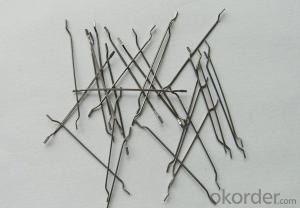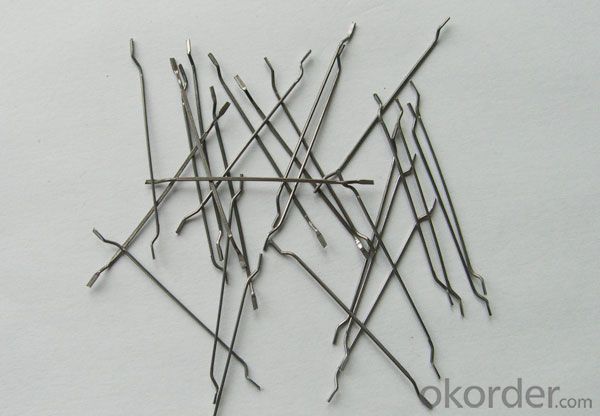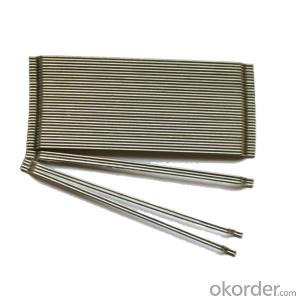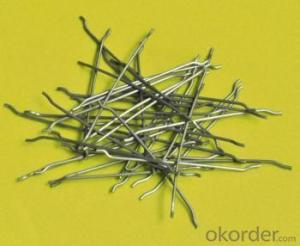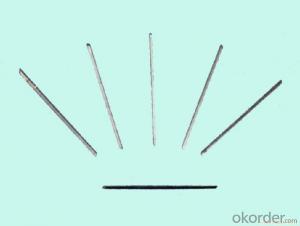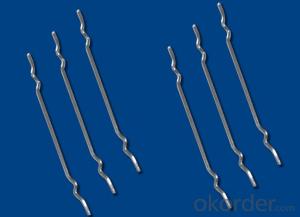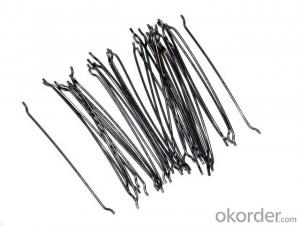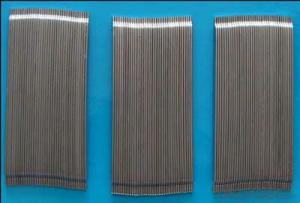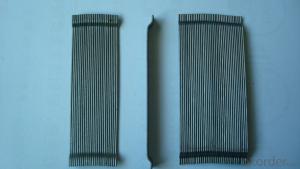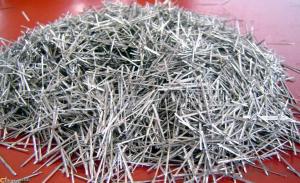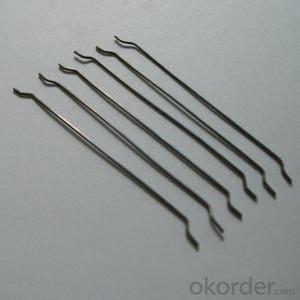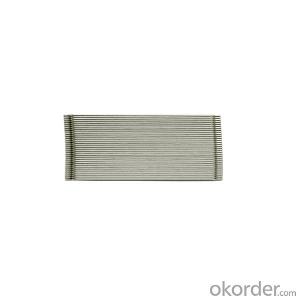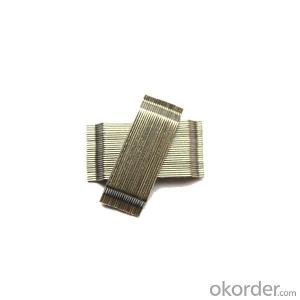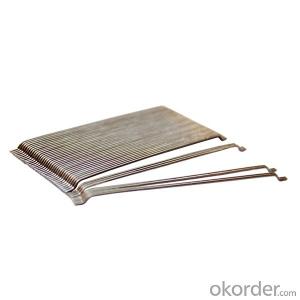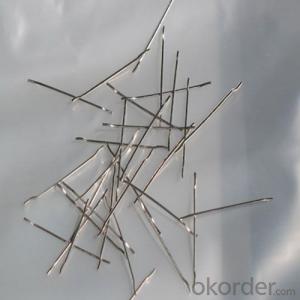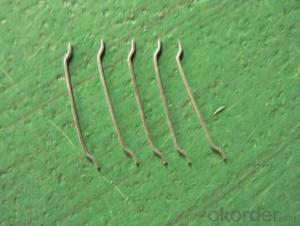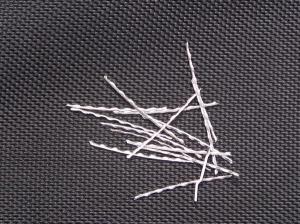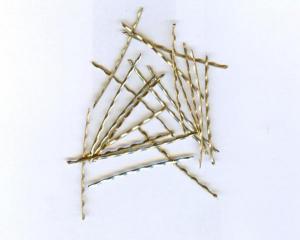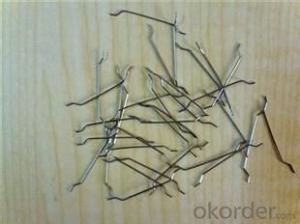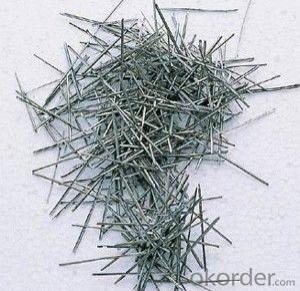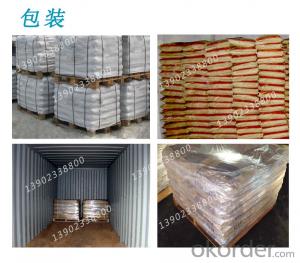Melt Extract Stainless Steel Fiber 0.75mm*60mm Hook End CNBM China
- Loading Port:
- Tianjin
- Payment Terms:
- TT OR LC
- Min Order Qty:
- 2000 kg
- Supply Capability:
- 250000 kg/month
OKorder Service Pledge
OKorder Financial Service
You Might Also Like
Quick Details
Place of Origin: Shandong, China (Mainland)
Model Number: steel fiber
material: steel wire
application: concrete reinocement
appearance: claer and bright
type: steel fiber for concrete
Product features
1.ISO 9001 certificated
2.70% for Europe, Middle Asia, America market
3.Have the most number of steel fiber machine in china
Specifications
Material : Cold-draw steel wire
Tensile Strength: 750 Mpa-1200Mpa
Fiber Length : 20mm,25mm,30mm,40mm,60 mm
Conformance : ASTM A 820/ A 820 M
Widely used in
1) construction bridges
2)thin roof engineering
3)highway etc.
Picture
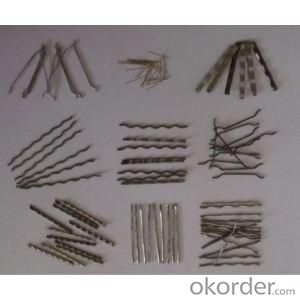
steel fiber for concrete
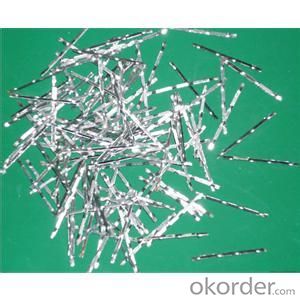
steel fiber for concrete
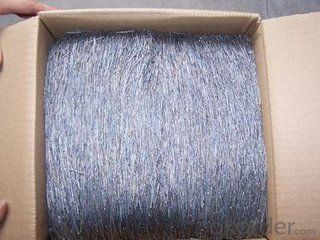
FAQ
we can produce any type steel fiber and of course we can make production according to your requirement
we have specilize in this field for almost 10 years ,with good quality and competitive price
1.ISO 9001 certificated
2.70% for Europe, Middle Asia, America market
3.Have the most number of steel fiber machine in china
Material : Cold-draw steel wire
Tensile Strength: 750 Mpa-1200Mpa
Fiber Length : 20mm,25mm,30mm,40mm,60 mm
Conformance : ASTM A 820/ A 820 M
Widely used in
1) construction bridges
2)thin roof engineering
3)highway etc.
- Q: How does melt extract stainless steel fiber affect the freeze-thaw resistance of concrete?
- Melt extract stainless steel fiber positively affects the freeze-thaw resistance of concrete by enhancing its durability and minimizing damage caused by repeated freezing and thawing cycles. The addition of these fibers helps to reduce cracking, improve tensile strength, and enhance the overall performance of concrete in harsh weather conditions.
- Q: What is the optimal dosage of melt extract stainless steel fiber in concrete?
- The optimal dosage of melt extract stainless steel fiber in concrete depends on various factors such as the specific application, desired performance characteristics, and the type of concrete mix being used. It is recommended to consult with a structural engineer or a concrete expert to determine the appropriate dosage that will meet the specific requirements of the project.
- Q: What are the advantages of using melt extract stainless steel fiber in concrete reinforcement?
- Using melt extract stainless steel fiber in concrete reinforcement offers several advantages. Firstly, stainless steel fibers enhance the mechanical properties of concrete, increasing its tensile strength, toughness, and durability. This leads to improved resistance against cracking, impact, and fatigue, thereby extending the lifespan of the concrete structure. Additionally, stainless steel fibers provide excellent corrosion resistance, protecting the concrete from deterioration caused by exposure to harsh environmental conditions, chemicals, or chloride ions. Furthermore, the addition of stainless steel fibers enhances the fire resistance of concrete, as they can withstand high temperatures without melting or losing their structural integrity. This makes it an ideal choice for applications that require fire-resistant structures like tunnels, industrial buildings, or firewalls. Lastly, stainless steel fibers offer improved workability and ease of construction. They can be easily mixed into the concrete mix, ensuring uniform distribution throughout the structure. This eliminates the need for additional reinforcement like rebar or mesh, simplifying the construction process and reducing labor and material costs. Overall, using melt extract stainless steel fiber in concrete reinforcement provides numerous advantages such as increased strength, corrosion resistance, fire resistance, and improved workability, making it a desirable choice for various construction applications.
- Q: What is the tensile strength of melt extract stainless steel fiber?
- The tensile strength of melt extract stainless steel fiber can vary depending on the specific grade and manufacturing process, but it typically ranges from 1000 to 2000 MPa (megapascals).
- Q: Can melt extract stainless steel fiber be used in earthquake-resistant concrete structures?
- Yes, melt extract stainless steel fiber can be used in earthquake-resistant concrete structures. Stainless steel fibers provide enhanced ductility and tensile strength to the concrete, improving its ability to withstand seismic forces. The fibers help to prevent cracking and increase the overall durability of the structure, making it more resistant to earthquake-induced damage.
- Q: How does melt extract stainless steel fiber improve the strength of concrete?
- There are several mechanisms through which melt extract stainless steel fiber enhances the strength of concrete. Firstly, the addition of these fibers reinforces the concrete and improves its flexural and tensile strength. Acting as small reinforcements, the fibers resist cracking and increase the overall durability of the concrete structure. Furthermore, these stainless steel fibers help control shrinkage and cracking by reducing the formation of micro-cracks. During the drying and shrinkage process of concrete, the fibers act as reinforcement, preventing the development of cracks and maintaining the concrete's strength. Moreover, the unique properties of stainless steel, including its high tensile strength and resistance to corrosion, contribute to the overall improvement in concrete strength. These fibers are highly resistant to chemical attacks, moisture, and extreme temperature changes, ensuring the concrete's structural integrity over time. Additionally, the homogenous distribution of stainless steel fibers throughout the concrete matrix enhances the bond strength between the fiber and the concrete mixture. This improved bond strength increases the concrete's load-bearing capacity and provides better resistance to impact and vibration. In summary, melt extract stainless steel fiber improves concrete strength through various means, such as enhancing flexural and tensile strength, controlling shrinkage and cracking, providing resistance to chemical attacks and extreme weather conditions, and improving bond strength. These factors result in a more robust, durable, and long-lasting concrete structure.
- Q: Can melt extract stainless steel fiber be used in architectural concrete applications?
- Yes, melt extract stainless steel fiber can be used in architectural concrete applications. Stainless steel fibers are often added to concrete mixtures to increase its strength, durability, and resistance to cracking. The melt extract stainless steel fibers are particularly effective in architectural concrete applications due to their high tensile strength and corrosion resistance. These fibers can help to reinforce the concrete, improve its structural integrity, and provide additional protection against potential damage from environmental factors or heavy loads. Moreover, the use of stainless steel fibers in architectural concrete can also enhance the aesthetic appearance of the finished product, as they can be easily polished to create a smooth and shiny surface. Overall, melt extract stainless steel fibers are a suitable choice for architectural concrete applications, offering both functional and aesthetic benefits.
- Q: Is melt extract stainless steel fiber suitable for use in high-temperature applications?
- Yes, melt extract stainless steel fiber is suitable for use in high-temperature applications. This type of fiber is specifically designed to withstand extreme heat and maintain its structural integrity. It has a high melting point and excellent resistance to oxidation, making it ideal for use in environments with elevated temperatures. Melt extract stainless steel fiber can be used in applications such as furnace linings, kilns, and high-temperature insulation. It provides reinforcement and enhances the overall strength of the material it is incorporated into, making it a reliable choice for high-temperature applications.
- Q: How does melt extract stainless steel fiber improve the bond strength of shotcrete?
- Shotcrete bond strength is improved in multiple ways by melt extract stainless steel fiber. Firstly, the reinforcement provided by the steel fibers within the shotcrete mix increases the material's strength. The fibers are evenly distributed throughout the mix when applied, creating a reinforcement network that enhances overall bond strength. Secondly, the high aspect ratio of the stainless steel fibers, characterized by their length and thinness, allows them to effectively bridge any cracks or voids that may form within the shotcrete. By bridging these gaps, the fibers prevent crack propagation and enhance material cohesion, thereby increasing bond strength. Moreover, the stainless steel fibers also enhance shotcrete durability. With corrosion resistance properties, they can withstand harsh environments and prevent degradation over time. This durability ensures that the bond strength of the shotcrete remains intact for an extended period, even under challenging conditions. In conclusion, melt extract stainless steel fiber improves shotcrete bond strength through reinforcement, crack bridging, and increased durability. This makes shotcrete more reliable and effective for various construction applications, including tunnel linings, retaining walls, and structural repairs.
- Q: Can melt extract stainless steel fiber be used in wastewater pipeline construction?
- Yes, melt extract stainless steel fiber can be used in wastewater pipeline construction. Stainless steel fiber is known for its excellent corrosion resistance, making it a suitable material for use in wastewater pipelines where the presence of corrosive chemicals and substances is common. It is also durable and has high tensile strength, making it suitable for withstanding the pressure and stress that pipelines are subjected to. Additionally, stainless steel fiber has low thermal expansion properties, which helps to prevent the pipeline from warping or distorting due to temperature changes. Overall, the use of melt extract stainless steel fiber in wastewater pipeline construction can contribute to the longevity and reliability of the pipeline system.
Send your message to us
Melt Extract Stainless Steel Fiber 0.75mm*60mm Hook End CNBM China
- Loading Port:
- Tianjin
- Payment Terms:
- TT OR LC
- Min Order Qty:
- 2000 kg
- Supply Capability:
- 250000 kg/month
OKorder Service Pledge
OKorder Financial Service
Similar products
Hot products
Hot Searches
Related keywords
